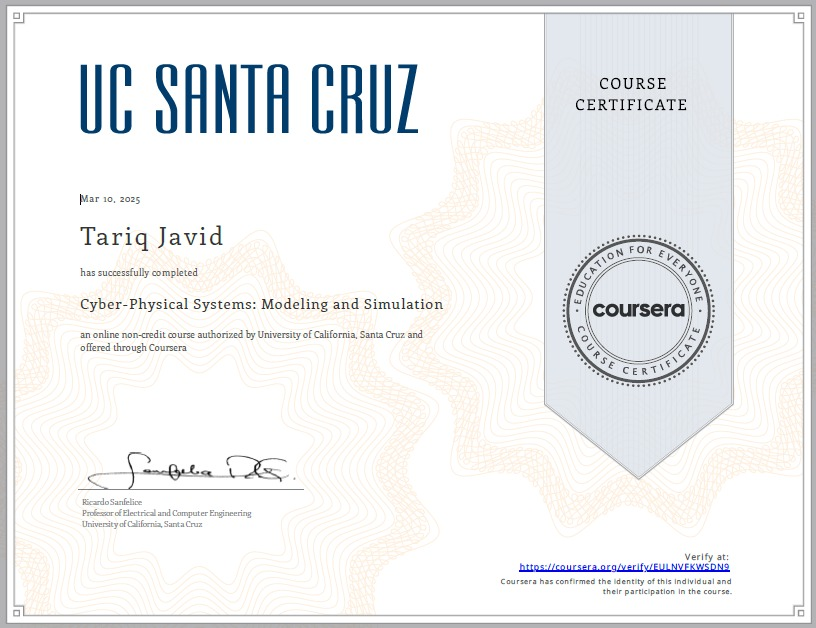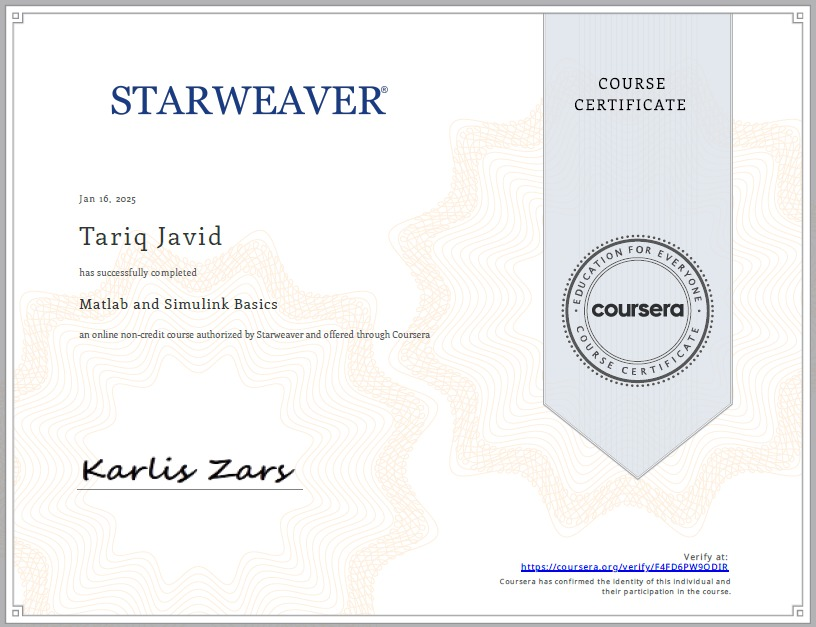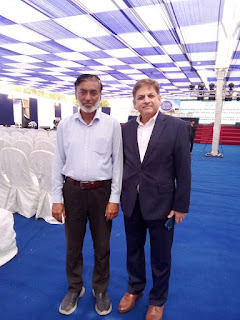 |
Friday, December 26, 2025
OpenFOAM: forwardStep
Saturday, December 20, 2025
Cloud Computing: An Overview
Sunday 21 December 2025
As the Fall 2025 semester final examinations are approaching, we are now concluding our graduate-level course on Cloud Computing. An overview image shows the topics that are part of the course. The course is designed to cover the basics (knowledge) and aims to develop essential skills toward a readiness to work with cloud services, especially from top vendors like Amazon, Google, and Microsoft. In my opinion, the course is a first step towards a vast era of IT-enabled business.
Ref. Textbook
The Cloud Computing Book: The Future of Computing Explained 1st Edition by Douglas Comer, Chapman and Hall/CRC, (July 1, 2021), 288 pages, ISBN-10: 0367706806, ISBN-13: 978-0367706807
Wednesday, December 10, 2025
Gmsh to Create elbow.msh and Use it in OpenFOAM Tutorial
Friday 05 December 2025
It is interesting to think about and create the elbow geometry in Gmsh for the 2D elbow mesh. Figure 1 shows the drawing [1].
Execute the commands gmshToFoam elbow_new.msh and checkMesh. Ensure the Mesh OK and a new folder polyMesh in the constant folder.
- For p and U in folder 0, use type slip; for frontAndBackPlanes
Sunday, December 7, 2025
Undergraduate Biomedical Engineering Final Year Design Projects 2025-2026
Monday 08 December 2025
BE Biomedical Engineering FYDP 2025-2026
Stream 1. Computational Fluid Dynamics in Blood Flow
These projects involve foundational Computational Fluid Dynamics (CFD) modeling using commercial or open-source software (like ANSYS Fluent, OpenFOAM, or even MATLAB-based fluid simulators).
Project 1.1. CFD Analysis of Carotid Artery Stenosis
Model steady-state blood flow through a simplified, idealized carotid artery with varying degrees of stenosis (narrowing). Calculate and visualize the change in pressure drop and Wall Shear Stress (WSS) as the narrowing increases from 30% to 70%. Relate results to the risk of plaque rupture.
Project 1.2. Aortic Coarctation Hemodynamics
Simulate flow through a simplified aortic coarctation (a congenital narrowing of the aorta). Compare the velocity profiles and turbulence levels upstream and downstream of the coarctation. Determine the optimal mesh resolution required for accurate turbulence modeling.
Project 1.3. Non-Newtonian Fluid Model in Small Vessels
Investigate the effect of modeling blood as a non-Newtonian fluid (e.g., using the Casson or power-law model) versus a simple Newtonian fluid in a small capillary or arteriole. Perform 2D simulations for both models and quantify the difference in the velocity profiles and viscosity distribution.
Steam 2. Cyber Physical Systems (CPS) in Medical IoT
These projects focus on integrating physical medical devices with computational and network infrastructure, typical of Medical Internet of Things (MIoT).
Project 2.1. Smart Vitals Monitoring Patch (CPS Design)
Design and prototype a low-power, integrated system for continuous monitoring of basic vitals (e.g., heart rate, skin temperature). Physical System: Select and integrate appropriate sensors (e.g., ECG, PPG, thermistor). Cyber System: Develop embedded software (e.g., using Arduino/Raspberry Pi) for data acquisition and local processing. Connectivity: Implement a basic wireless communication protocol (Bluetooth/Wi-Fi) to stream encrypted data to a mobile application or cloud service (the "cyber" layer).
Project 2.2. Intelligent Drug Dispenser with Inventory Tracking
Develop a prototype for a smart medication dispenser that tracks user adherence and monitors the remaining pill inventory. Use weight sensors or optical sensors to detect dispensing events and inventory level. Integrate a real-time clock and a notification system (e.g., LED lights, buzzer, or SMS/email alerts via a gateway) to prompt the user and report non-adherence.
Project 2.3. Wearable Fall Detection and Alert System
Create a CPS that detects a patient fall and automatically alerts a caregiver. Use an accelerometer/gyroscope on a wearable device to detect the characteristic motion pattern of a fall. Implement a robust signal processing algorithm (e.g., thresholding, machine learning classification) and integrate the system with a communication module to send geo-location data and an alert message.
Steam 3. Quantum Computing in Biosensors (Conceptual/Simulated)
Given the complexity and hardware requirements of true quantum computing, undergraduate projects in this area typically focus on simulating quantum concepts or applying quantum-inspired algorithms to biosensing data.
Project 3.1. Quantum-Inspired Optimization for Sensor Placement
Apply a quantum annealing or quantum-inspired optimization algorithm(simulated on a classical computer) to solve a complex optimization problem in biosensor design, such as optimal placement of sensors on the body or within a microfluidic chip. Formulate the sensor placement as an Ising model or Quadratic Unconstrained Binary Optimization (QUBO) problem and use an open-source library (like D-Wave's Ocean tools or similar classical simulators) to find the best configuration.
Project 3.2. Modeling of a Quantum Dot Biosensor (Focus on Sensing Mechanism)
Develop a theoretical or computational model for a Quantum Dot (QD)-based biosensor to analyze how its quantum properties (e.g., photoluminescence spectrum) change upon binding with a target molecule (e.g., a specific protein). Use computational chemistry or quantum mechanical simulation tools (like Gaussian, VASP, or simpler online tools) to model the energy levels and optical properties of the QD with and without the binding analyte.
Project 3.3. Quantum Machine Learning for ECG Classification (Simulated)
Implement a simulated Quantum Machine Learning (QML) algorithm, such as a Quantum Support Vector Machine (QSVM), to classify simple ECG patterns (e.g., normal vs. atrial fibrillation). Use an open-source quantum programming framework (like Qiskit or Cirq) to train a small-scale model on a simplified dataset of pre-processed ECG features, demonstrating the potential for quantum speedup in medical diagnostics.
Saturday, November 22, 2025
Goodbye Parents
Tuesday, October 21, 2025
Commemoration Ceremony
Monday, October 20, 2025
Receiving the NAEAC (Agricultural) Council Accreditation Certificates from Competent Authority
This is a matter of great honor to receive the accreditation certificates, from the Competent Authority, for BS FST program in X Category and BS Biotechnology program in W Category. Thanks to the DAS team for an excellent achievement for our Hamdard University. Photograph courtesy of FEST admin Monday 20 October 2025, FEST conference room.
Invited Guest Speaker Session: Drug Development Process and Effective Drug Properties
Venue: Monday 20 October 2025, DAS
Invited Guest Speaker Session for BS Biotechnology Faculty and Students
Topic: Drug Development Process & Effective Drug Properties
Speaker: Dr. Syed Rehan Ali, Manager QC BioPharma, Sami Pharmaceuticals
Friday 17th October 2025 Yad e Hk. Mohammed Said Shaheed
The program was well organized. After Dua at the Mazar, the event was held at BAH auditorium. The chief guest was famous journalist Ghazi Salahuddin.
Friday, October 10, 2025
Circular Buffer in C++
10.10.2025
It took some time to understand the code generated by an AI tool. After a long time, an in-depth is required. The focus is on the "Stores the last 4 heart rate readings in a circular buffer." This corresponds to the initial two lines of the C++ code. The images below include simple code examples to reproduce the same for better understanding.
Sunday, July 6, 2025
Monday, June 30, 2025
Final Year Design Project Exhibition at NED CISE
Saturday 19 April 2025
Dr. Tariq Javid, Prof. & Chair BME attended the final year design project exhibition organized by NED CISE department on Saturday, 19 April 2025. There were a large number of undergraduate projects displayed by the student groups, including a few related to healthcare.
Sunday, March 16, 2025
Hamdard University Karachi Convocation 2025
Final Year Design Projects for BE BME in 2025
Monday 17 March 2025
1. Noninvasive System for Depression Assessment
Abstract
This final year project focuses on the design and development of a Noninvasive System for Depression Assessment aimed at providing an accessible, efficient, and user-friendly tool for early detection and monitoring of depression. Depression is a prevalent mental health disorder, yet many individuals remain undiagnosed due to stigma, lack of access to healthcare, or inadequate screening methods. This project addresses these challenges by leveraging noninvasive technologies, such as facial expression analysis, voice pattern recognition, and physiological signal monitoring (e.g., heart rate variability), to assess depressive symptoms. The system integrates machine learning algorithms to analyze behavioral and physiological data, providing a comprehensive assessment of an individual's mental state. By utilizing noninvasive sensors and wearable devices, the system ensures minimal discomfort and maximum convenience for users. The project also includes a user-friendly interface for both patients and healthcare providers, enabling seamless data interpretation and actionable insights. Preliminary testing has demonstrated promising results in accurately identifying depressive symptoms, with a focus on improving early intervention and personalized care. This project not only contributes to the field of mental health technology but also highlights the potential of noninvasive methods in revolutionizing depression assessment. Future work will focus on enhancing accuracy, scalability, and integration with existing healthcare systems to support widespread adoption.
Keywords: Depression assessment, noninvasive technology, machine learning, mental health, wearable devices.
2. Design and Development of an IoT-Enabled Smart Hospital Bed for Enhanced Patient Monitoring and Care
Abstract
The rapid evolution of smart healthcare technologies has paved the way for innovative solutions to improve patient care and hospital efficiency. This project focuses on the design and development of an IoT-enabled smart hospital bed, aimed at enhancing patient monitoring, safety, and comfort. The proposed smart bed integrates advanced sensors, real-time data analytics, and IoT connectivity to provide a comprehensive healthcare solution. Key features include pressure sensors to detect and prevent bedsores, weight sensors to monitor patient mobility, and automated bed adjustment mechanisms to support patient positioning and reduce the risk of falls. The bed is equipped with wireless communication modules that transmit real-time patient data, such as heart rate, respiratory rate, and body temperature, to a centralized monitoring system accessible to healthcare providers. This enables timely interventions and reduces the workload on medical staff. Additionally, the system includes an alert mechanism to notify caregivers of critical changes in patient conditions or bed status. The IoT framework allows for remote monitoring, ensuring continuous care even when healthcare providers are not physically present. The project also addresses challenges such as data security, system reliability, and cost-effectiveness to ensure practical implementation in hospital settings. By combining cutting-edge technology with user-centric design, this smart hospital bed aims to improve patient outcomes, reduce hospital stays, and optimize resource utilization. The proposed solution represents a significant step toward modernizing healthcare infrastructure, offering a scalable and efficient approach to patient care in the era of smart hospitals.
Keywords: IoT-enabled smart hospital bed, patient monitoring, healthcare technology, smart healthcare systems, remote patient care, IoT in healthcare, real-time monitoring, patient safety, hospital bed design, medical IoT, smart sensors, healthcare innovation, patient care enhancement, wireless monitoring, health data analytics.
3. Design and Implementation of a Quantum-Enhanced Cyber-Physical System for Smart Biomedical Devices Using Machine Learning
Abstract
The rapid advancement of technology in healthcare has created opportunities for innovative solutions that integrate cyber-physical systems (CPS), quantum computing, and machine learning (ML) to revolutionize biomedical devices. This project proposes the design and implementation of a quantum-enhanced CPS for smart biomedical devices, leveraging ML to improve functionality, accuracy, and patient outcomes. Biomedical devices, such as wearable health monitors, insulin pumps, and pacemakers, are inherently CPS, combining physical components with computational algorithms to monitor and regulate physiological processes. By incorporating quantum computing, these devices can achieve unparalleled computational power, enabling real-time processing of complex biological data and optimization of treatment protocols. Quantum algorithms can address computationally intensive tasks such as protein folding, drug discovery, and genetic analysis, which are beyond the capabilities of classical systems. Additionally, ML algorithms enhance the predictive and adaptive capabilities of biomedical devices, allowing them to learn from patient data, detect anomalies, and personalize treatments. For instance, ML models can predict cardiac arrhythmias or glucose fluctuations, enabling proactive interventions. The proposed system also addresses critical challenges such as data security, energy efficiency, and scalability, ensuring robust and reliable operation in healthcare environments. This interdisciplinary approach not only improves patient outcomes but also paves the way for next-generation biomedical devices that are smarter, faster, and more adaptive. By bridging the gap between physical systems, advanced computing, and intelligent algorithms, this project contributes to the evolution of precision medicine and the development of sustainable healthcare solutions, aligning with global efforts to harness technology for improved well-being. The proposed system represents a significant step toward transforming healthcare delivery through innovation and integration.
Keywords: Quantum-enhanced systems, cyber-physical systems, smart biomedical devices, machine learning in healthcare, quantum computing, biomedical engineering, IoT in healthcare, smart health monitoring, quantum algorithms, medical device innovation, real-time health analytics, AI-driven healthcare, quantum machine learning, biomedical signal processing, advanced healthcare technology.
Generative Technology: DeepSeek
Friday, March 14, 2025
Technical Session Chair at 26th IEEE INMIC Conference organized by SHU
December 30-31, 2024
Hamdard University BME alumni from abroad presented their research work in poster form at the 26th IEEE INMIC conference, organized by SHU. I co-chaired a session with Dr. Raja Masood Larik of NED UET on the second day of the conferece.
Tuesday, March 11, 2025
Completion of CPS Course
10 March 2025
The CPS course completed after about three months of learning. This is a very good and hands-on course. The resource person was Prof. Ricardo Sanfelice, Chair at the Department of Electrical and Computer Engineering, University of California at Santa Cruz. In order to complete the course, I have to complete another course to refresh MATLAB and to gain insights of Simulink. Thanks to HEC Digital Learning & Skills Enrichment Initiative Pakistan and Hamdard University for providing the opportunity to learn from the top of line academicians and researchers, aka, subject experts.
Friday, February 28, 2025
Biomedical Engineering Students Awarded Gold Category at 40th All Pakistan IEEEP Students' Seminar
20th February 2025
Hamdard University Biomedical Engineering students: Ms. Ramsha Qayyum, Ms. Khadija Razi, and Ms. Fakiha Arshad awarded Gold Category for the oral presentation of accepted research paper entitled, "Skin Disease Detection through Hybrid Deep Learning Method," at 40th All Pakistan IEEEP Students' Seminar, held at Salim Habib University, Karachi, on 20th February 2025. The research work was supervised by Dr. Muhammad Faris, Assistant Professor BME.
Attended: 8th All Pakistan DUHS-DICE Health Innovation Exhibition
25th February 2025
The 8th All Pakistan DUHS-DICE Health Innovation Exhibition 2025 was organized collaboratively by the Dow University of Health Sciences and DICE Foundation, USA. The event was held at DUHS Ojha Campus on 25th February 2025.
Saturday, February 1, 2025
Attending One-Day:Masterclass in Health Information Systems Global Perspective
Thursday 30th January 2025
Dr. Tariq Javid attended a one-day session entitled, Masterclass in Health Information Systems: Global Perspective." The session was organized by the Department of Biomedical Engineering, NED University of Engineering and Technology, LEJ Campus, Karachi; and held on Thursday 30th January 2025. The session started with a welcome speech by Prof. Dr. Eraj Humayun Mirza, Chair BME, NED UET, and a brief speech by Prof. Dr. Saad Ahmed Qazi, Meritorious Prof. & Dean Faculty of Electrical and Computer Engineering, NED UET. Prof. Dr. Maryati Mohd Yusof from Universiti Kebangsaan Malaysia was the resource person. The session was about the use of three life cycles: Plan-Do-Act-Check (PDAC) - a quality management methodology, Software Development Life Cycle (SDLC), and Business Process Management (BPM); as an integrated tool for identifying the errors and addressing the root cause. The first half was on the introduction of the health information system (HIS). After the prayer break and lunch, the second session - activity-based - was held. The session concluded by awarding certificates to participants and a group photograph.























































.jpeg)

.jpeg)
